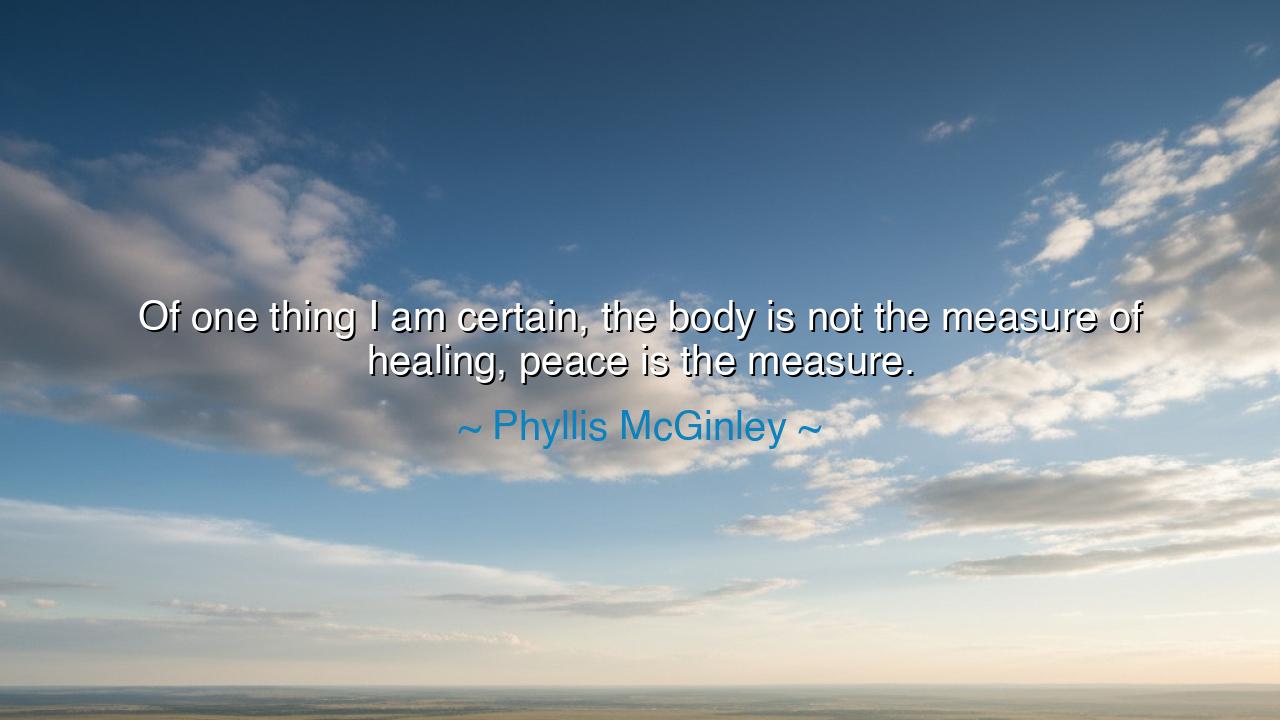
Of one thing I am certain, the body is not the measure of
Of one thing I am certain, the body is not the measure of healing, peace is the measure.






"Of one thing I am certain, the body is not the measure of healing, peace is the measure." Thus spoke Phyllis McGinley, poet and observer of the human heart. In her words lies a wisdom that surpasses the flesh, reaching into the very soul. For what she declares is this: that true healing is not counted in muscles restored, nor in wounds closed, nor in bodies made strong again, but in the presence of peace—the stillness of spirit, the quiet triumph of acceptance, the harmony of the self with life’s design. The body may falter, yet the soul may be whole.
The ancients, too, knew this truth. Did not Epictetus, the slave turned philosopher, declare that though his leg was broken, his spirit remained unbroken? Did not the prophets, when surrounded by strife and exile, speak of an inner peace that surpassed their outward affliction? The body is a vessel, and it weakens with time, but peace is the deeper treasure, the true mark of wholeness. For what use is a body in strength if the heart is in turmoil? And what loss is weakness of flesh if the soul rests serene?
McGinley’s insight strikes against the vanity of our age, which prizes only outward recovery, physical perfection, the restoration of what is seen. But she reminds us that a man bedridden may yet be whole if he has reconciled with his past, forgiven his enemies, and found quiet joy in his days. And she warns us that one who is vigorous in body but restless in spirit is still unhealed, for they carry wounds deeper than the skin. Healing, then, is not the mending of the body but the crowning of the soul with peace.
History itself gives us mirrors of this truth. Consider the life of Mahatma Gandhi. His body was frail, weakened by fasting, imprisonment, and long years of labor. Yet his spirit, clothed in peace, became unshakable. The measure of his healing was not in his physical vigor, but in the serenity and power that radiated from his inner life, healing divisions in the hearts of millions. Or think of Helen Keller, blind and deaf from childhood, yet filled with a peace and wisdom that outshone the strongest of men. Their bodies bore limits, yet their peace bore witness to a healing beyond all measure.
Children of tomorrow, take this lesson into your hearts: do not measure your life by the condition of your flesh alone. The body will weaken, as grass withers and flowers fade. But the spirit, crowned with peace, may flourish even in decline. Seek not only remedies for the body, but remedies for the soul: forgiveness where there is bitterness, stillness where there is turmoil, gratitude where there is lack. These are the true healers, and they will outlast the fleeting vigor of youth.
Practical wisdom lies here. When you face sickness, seek doctors, but also seek peace. When you are wounded by others, heal not only with time, but with forgiveness. When your body grows old, do not despair, but cultivate an inner calm that no age can steal. Pray, reflect, walk gently, and love deeply, for these are the acts that restore wholeness. Remember always that the end of life will come to every body, but to the soul that has made peace, there is no end to healing.
Thus the teaching is plain: the body is not the measure of healing, but peace is. Phyllis McGinley’s words remind us that true wholeness is not seen with the eyes but felt in the heart. So labor not only to cure the flesh but to cultivate peace, and you shall discover a healing that endures beyond death itself. For the body is dust, but peace is eternal.






AAdministratorAdministrator
Welcome, honored guests. Please leave a comment, we will respond soon